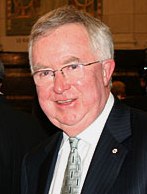Conference heralds start of a new relationships
 (CNS): Canada’s former Prime Minister, Joe Clark, presided over the inaugural Northern Caribbean Conference on Economic Development held last week at The Ritz-Carlton, and said that this meeting of minds was a start of a new relationship bringing the best people together to solve issues that affected all Northern Caribbean territories.“It has the potential to be a game changer,” he said. The conference examined the key issues impacting the region and was billed as a step towards a new era of co-operation in commerce, tourism, education, migration and crime.
(CNS): Canada’s former Prime Minister, Joe Clark, presided over the inaugural Northern Caribbean Conference on Economic Development held last week at The Ritz-Carlton, and said that this meeting of minds was a start of a new relationship bringing the best people together to solve issues that affected all Northern Caribbean territories.“It has the potential to be a game changer,” he said. The conference examined the key issues impacting the region and was billed as a step towards a new era of co-operation in commerce, tourism, education, migration and crime.
Organised by the Jamaica National Building Society, the conference brought together some of the most senior members of government from the region, including Bruce Golding, the Prime Minister of Jamaica; Kenneth McClintock, Secretary of State of Puerto Rico; P.J. Patterson, former Prime Minister of Jamaica; Edmund Bartlett, Jamaica’s Tourism Minister, as well as Cayman’s own Premier, McKeeva Bush and other members of the Legislative Assembly.
Golding noted that too often countries in the region were so intent on attracting the region’s nearest richest market, i.e. the US that they failed to recognise the synergies that existed among them, and spoke about the “inherent risk of insularity”.
Instead, countries of the region (which included the Cayman Islands, Jamaica, Puerto Rico, the Bahamas, Cuba, Haiti and the Dominican Republic) ought to be pooling their energies and working together to compete against the rest of the world.
“We need to make partnerships where they don’t exist and strengthen those where they do exist,” he said.
Calling for the countries of the region to collectively raise their voices when it came to regional issues, Golding spoke specifically about Jamaica’s hammering by the US on the flow of drugs from his country to the US. He said Jamaica was doing everything it could to stem the supply but not enough was done to reduce the demand. He talked about reengineering partnerships and equitable burden sharing to create a framework to get on top of the drugs issue.
Strengthening the regional tourism product was a theme that ran through the conference and Golding said that promoting a package of options for visitors to the Northern Caribbean would be a great enticement for holiday-makers seeking to blend and mix their vacations. “It would give them more bang for their buck,” he said.
In a similar vein, P.J. Patterson said that the Caribbean Sea was home to half the world’s cruise fleet and yacht traffic yet that had always been for the benefit of others.
“The Caribbean does not even own one cruise liner,” he lamented.
With the Northern Caribbean home to Spanish, French as well as English speaking countries, Patterson also called for the breaking down of what he termed “the linguistic divide”, calling for the education institutions of the region to ensure that all students were fluent in the languages of the region.
Edmund Bartlett, Jamaica’s Minister of Tourism said that the Caribbean needed to offer visitors much more than simply sun, sand and sea and look to the culture of the region as a lure. He said that opportunities arose within the BRIC (Brazil, Russia, India and China) markets for potential visitors to the region, but warned that as these were long haul markets the region would have to find innovative ways to entice them. Collective marketing, he said, was essential for the region to reach such markets.
Secretary of State for Puerto Rico, Kenneth McClintock, talked about connecting Northern Caribbean countries together to create a larger single market for energy, in particular sustainable energy. He spoke about the idea of making the Northern Caribbean the first self-sufficient energy region and said that Puerto Rico was already connected to neighbours the US Virgin Islands and the Dominican Republic, and urged others to consider interconnectivity opportunities.
During a panel discussion on issues relating to immigration, climate change and regional economic policy, Dr Elizabeth Thomas-Hope, Professor of Geography and a researcher/publisher on Caribbean migration, said that small societies were afraid of immigration but that it provided opportunities and enhanced economic growth of the country.
“Immigration is very beneficial to the host country,” she confirmed, but added that the public’s view did not always agree.
Alluding to a popular Caribbean song, she said that the public often moaned that immigrants “come to me party and want to take over”.
She said that migration was a major challenge in the region.
Category: Local News

